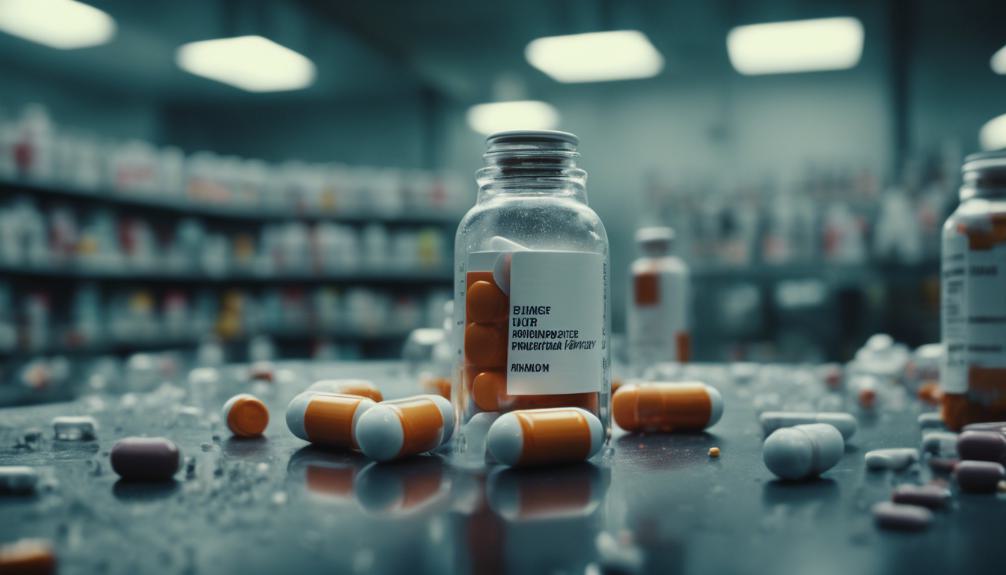Medications Face Legal Fire for Hidden Risks
The recent legal challenges facing a number of widely used medications over undisclosed health risks underscore a critical issue in the pharmaceutical industry: the balance between drug efficacy and patient safety. As these medications, intended for the treatment of various conditions, are scrutinized for adverse gastric effects that were not fully disclosed, questions arise about the ethical obligations of manufacturers in communicating potential risks. This situation not only highlights the importance of transparency in healthcare but also sets the stage for a broader discussion on the implications for patient trust and the regulatory landscape. The unfolding legal proceedings promise to reveal much about the practices within the pharmaceutical sector and the potential need for more stringent oversight.
Key Takeaways
- Medications like Ozempic and Wegovy are under legal scrutiny for not disclosing severe gastric side effects.
- Patients have experienced adverse effects, leading to increased hospitalizations and emergency room visits.
- The legal challenges stress the need for transparency and full disclosure of potential risks by drug manufacturers.
- Emphasizing patient well-being, the medical community is reevaluating the safety profiles of these medications.
Medications Under Scrutiny

Several medications, including Ozempic, Wegovy, Saxenda, Victoza, Mounjaro, and Rybelsus, have come under legal scrutiny due to alleged adverse gastric effects and failure by manufacturers to fully disclose associated health risks. This emerging situation underscores the critical importance of transparency in the pharmaceutical industry, especially when it concerns the well-being of patients. The allegations suggest that the involved companies may not have provided thorough information regarding the potential side effects of these medications, thereby putting patients at risk. As service-oriented professionals, it is paramount to advocate for the rights of those we serve by ensuring they are fully informed about the treatments they receive. This case highlights the need for accountability and the ethical responsibility of manufacturers to prioritize patient safety and informed decision-making above all.
Adverse Gastric Effects

What are the specific adverse gastric effects linked to medications such as Ozempic, Wegovy, Saxenda, Victoza, Mounjaro, and Rybelsus, prompting increased emergency room visits and hospitalizations? These medications, while offering therapeutic benefits for conditions like diabetes and obesity, have been associated with a range of gastrointestinal complications. These adverse effects include gastroparesis, a condition where stomach emptying is delayed, leading to nausea and vomiting; ileus, the cessation of bowel movements; acute pancreatitis, an inflammation of the pancreas; and bowel obstruction, which can cause severe abdominal pain and bloating. Additionally, there is a risk of pulmonary aspiration, where vomited material is breathed into the lungs, posing a serious threat to patient health. These complications highlight the importance of monitoring and management in those receiving these treatments.
Medical and Legal Response

In response to the reported adverse gastric effects of medications such as Ozempic, Wegovy, Saxenda, Victoza, Mounjaro, and Rybelsus, both the medical community and legal entities are reevaluating their safety profiles and considering critical accountability measures. Healthcare professionals are conducting thorough reviews of the medications' impacts, seeking to balance the benefits of these treatments against the risks. Simultaneously, legal actions are being initiated to seek justice for those who may have been harmed due to a lack of disclosure regarding potential side effects. These steps are vital in ensuring that patient safety remains a paramount concern, with both sectors working diligently to address the issues at hand. This collaborative effort underlines a commitment to the well-being of individuals relying on these treatments for better health outcomes.
Importance of Transparency

The recent legal challenges facing medications such as Ozempic and Wegovy underscore the critical need for transparency in the pharmaceutical industry. In an era where informed decision-making is paramount, the obligation of drug manufacturers to fully disclose potential risks associated with their products cannot be overstated. Transparency is not merely a legal requirement but a cornerstone of ethical practice, serving to protect and inform those who rely on medications for their health and well-being. It fosters trust between the public and pharmaceutical companies, ensuring that individuals are equipped with detailed information to make informed choices about their treatment options. As the industry faces increased scrutiny, the imperative for open communication and honesty becomes even more critical, highlighting the integral role of transparency in safeguarding public health.
Patient Well-being Focus

Building on the imperative for transparency in pharmaceutical practices, focusing on patient well-being represents the next logical step in ensuring the health and safety of those who depend on medications. This focus shifts from merely disclosing potential side effects to actively ensuring that medications contribute positively to patient health. The recent scrutiny of medications like Ozempic and Wegovy underlines the necessity of this approach. By prioritizing the well-being of patients, pharmaceutical companies can foster trust and demonstrate their commitment to more than just profitability. It involves a thorough consideration of how medications affect patients' lives, from the physical side effects to the psychological impact of managing chronic conditions. Ultimately, emphasizing patient well-being is not just ethically sound—it's a vital component of responsible healthcare.
Legal Action Overview

Recent legal actions against pharmaceutical giants Eli Lilly and Novo Nordisk have brought to light the significant concern over undisclosed health risks associated with medications such as Ozempic and Wegovy. This development underscores a pivotal moment in pharmaceutical accountability, where the health and safety of the public are prioritized. The legal proceedings aim to address the allegations of failure by these companies to fully disclose potential adverse effects, thereby not allowing patients and healthcare providers to make fully informed decisions regarding their treatment options. The pursuit of legal recourse is not merely about seeking compensation for those adversely affected but serves a greater purpose of reinforcing the importance of transparency in the pharmaceutical industry. It's a clarion call for the industry to uphold ethical standards, ensuring that patient welfare is always at the forefront of medication development and marketing.
Industry Impact Analysis

In the wake of legal actions against pharmaceutical companies like Eli Lilly and Novo Nordisk, the pharmaceutical industry faces a critical juncture, necessitating a thorough analysis of the potential impacts on drug manufacturing practices and market confidence. These legal challenges not only spotlight the importance of transparency in disclosing medication risks but also underscore the need for the industry to prioritize patient safety above all. The scrutiny could lead to more stringent regulatory requirements and a reassessment of how risks are communicated to the public. This period of legal and ethical examination represents an opportunity for the industry to reinforce its commitment to serving the health needs of individuals, ensuring that trust in pharmaceutical innovations remains intact. The focus must be on aligning business practices with the paramount goal of enhancing patient well-being.
Empowering Informed Decisions

Amidst the legal challenges faced by pharmaceutical companies, the emphasis on empowering patients to make informed decisions about their medications has never been more imperative. The unfolding legal actions highlight a critical need for transparency and patient education. Ensuring that individuals are well-informed about the potential risks and benefits of their medications fosters a healthcare environment where trust and safety are paramount. This approach not only helps in mitigating the risks associated with medication but also enhances patient autonomy. By prioritizing the dissemination of detailed and accessible information, healthcare providers and pharmaceutical companies can greatly contribute to more informed health choices. Such initiatives are essential in cultivating a healthcare landscape where patients feel supported and empowered in their decision-making processes.
Frequently Asked Questions
How Can Patients Currently Using These Medications Monitor Themselves for Early Signs of Adverse Gastric Effects?
Patients currently using medications such as Ozempic, Wegovy, Saxenda, Victoza, Mounjaro, and Rybelsus should vigilantly monitor for early signs of adverse gastric effects to safeguard their health. This includes being alert to symptoms like persistent nausea, vomiting, abdominal pain, or unusual digestive disturbances. It is imperative to seek immediate medical advice upon experiencing these symptoms. Proactive communication with healthcare professionals enables the timely identification and management of potential complications, ensuring patient safety and well-being.
What Alternative Treatments Are Available for Patients Who Decide to Discontinue These Medications Due to Health Concerns?
Patients seeking alternatives to medications such as Ozempic, Wegovy, Saxenda, Victoza, Mounjaro, and Rybelsus, due to health concerns, have several options. These include lifestyle modifications like diet and exercise for weight management and diabetes control. Additionally, alternative pharmaceuticals with a different risk profile may be considered, under medical guidance. Consulting healthcare professionals is important to tailor a safe and effective treatment plan, ensuring informed decision-making for best health outcomes.
How Does the Potential Legal Action Affect the Availability of These Medications for New Patients Seeking Treatment?
The potential legal action against certain medications raises concerns regarding their availability for new patients. As manufacturers may face legal scrutiny for not disclosing potential risks, the reassessment of these drugs' safety profiles is likely. This situation could lead to temporary restrictions or changes in prescribing guidelines, impacting patient access. Healthcare professionals must stay informed and consider alternative treatments, ensuring patient safety and informed decision-making remain paramount in the treatment process.
Are There Any Specific Dietary or Lifestyle Changes Recommended for Patients Taking These Medications to Minimize the Risk of Adverse Effects?
For patients prescribed medications such as Ozempic, Wegovy, Saxenda, Victoza, Mounjaro, and Rybelsus, healthcare providers often recommend specific dietary and lifestyle adjustments to mitigate adverse effects. These may include a balanced diet, regular physical activity, and close monitoring of gastrointestinal symptoms. It's important for patients to maintain open communication with their healthcare team, enabling personalized guidance based on their medical history and current health status, to optimize treatment outcomes while minimizing risks.
What Are the Mechanisms Behind How These Medications Cause the Adverse Gastric Effects Mentioned?
Ironically, while medications like Ozempic and Wegovy promise to lighten the burden of disease, they may inadvertently weigh down the digestive system. These drugs operate by mimicking gut hormones that regulate blood sugar and appetite, potentially slowing gastric emptying and altering gut motility. This mechanism, intended to benefit metabolic health, can paradoxically lead to adverse gastric effects, underscoring the importance of informed patient care and thorough medication risk communication.
Conclusion
In the labyrinth of healthcare, the recent legal storm surrounding widely used medications has illuminated the critical intersection between transparency and patient safety. This case unfolds as a cautionary tale, reminding the pharmaceutical industry and healthcare professionals that the path to healing must be paved with clear, thorough information about potential risks. As legal proceedings cast a spotlight on these practices, it is hoped that this will foster a more informed patient populace and make certain that the sanctity of patient well-being remains paramount in the quest for health solutions.

This post has been generated by AI and was not reviewed by editors. This is Not legal advice. Please consult with an attorney.